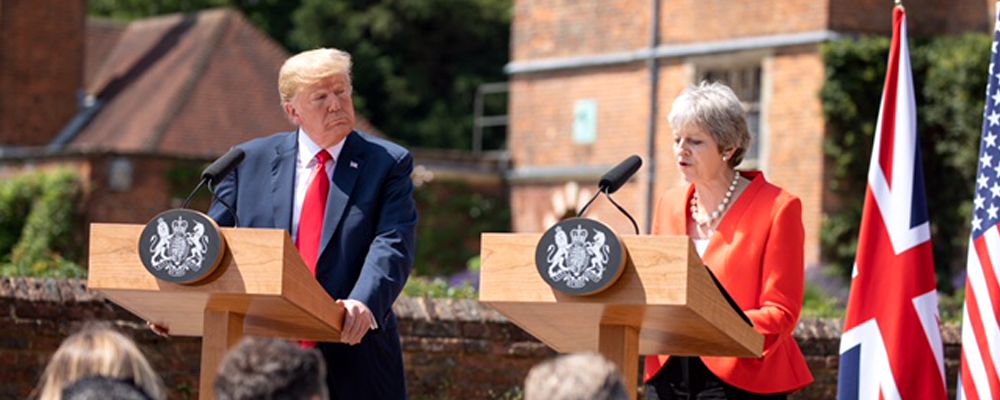A rather soft affair.
- Monday, July 16, 2018
 With the publication of the government’s white paper – The plan for the UK’s Brexit, it now seems almost inevitable that there will not be a substantial break away from the EU when Brexit formally occurs in March 2019. Instead, it will be a rather soft affair initially, with everything else being developed, negotiated and executed over many years thereafter. This should effectively allow the UK to exit without a sudden shock to businesses and travel while initially at least continuing to enjoy the benefits of being a member of the world’s largest free trade zone for a while longer.
With the publication of the government’s white paper – The plan for the UK’s Brexit, it now seems almost inevitable that there will not be a substantial break away from the EU when Brexit formally occurs in March 2019. Instead, it will be a rather soft affair initially, with everything else being developed, negotiated and executed over many years thereafter. This should effectively allow the UK to exit without a sudden shock to businesses and travel while initially at least continuing to enjoy the benefits of being a member of the world’s largest free trade zone for a while longer.
Speaking of free trade benefits, Donald Trump’s decision to engage the rest of the world in a full on trade war may actually provide us with a live demonstration of the economic impact of having to trade under significant tariff burdens. The real drama was not Trump’s ability to absolutely upset every one of the US’ hitherto allies, but his insistence on escalating the trade war with China. Knowing how sensitive the Chinese public is to any perception of being pushed around by imperial powers of old, it may have to go rather further down the road of confrontation than any one wants. The November US Midterm Elections also provide us with a time frame of how long it might last until he can reign back in trade hostilities without losing face with his electorate.
It is common knowledge that there are only losers in trade wars. This may also explain why stock markets are still refusing to price in any collateral damage that would occur to the US economy; they don’t really think Trump will go through with it. China’s current stock market correction is unlikely to be a one-sided reflection of who investors see as the likely losing side, but much more the manifestation of slowing growth in China and a realisation that this time the Chinese government is less likely to prop up markets through excessive demand stimulus as they have in the past.
The big question therefore was where things go from here. So far the global economy has coped quite well with tightening monetary conditions; the threat of a US led trade war and higher oil prices. Corporate earnings growth rates have therefore remained high. And because profits have risen faster than equity prices, equities are not valued above their historical averages, despite the strong returns they have generated for investors over the past years. The US is the exception to this, but then the US economy is currently also the one with the strongest growth momentum.
Looking forward, stock markets will come to price in a slower rate of growth. The US economy has recently shown signs of a topping out, as it is becoming increasingly harder for companies to fill job vacancies and the cost of capital is rising as a result of the central bank’s steady, quarterly raising of interest rates, which have now reached 2%. The deceleration could also be a first sign of business uncertainty in light of Trump’s trade war with the rest of the world. Markets may still be largely discounting it to actually happen, given it is accepted wisdom that it is foolish to pursue trade wars, but businesses have started to say that they are refraining from certain business investments until the uncertainty around future trading positions clears.
Against this backdrop, there is a higher probability that global trade conditions will worsen, as Trump may have to actually curtail global trade flows for a while or risk losing face ahead of the crucial midterm election in November. At the same time, the economic improvement expected from the Eurozone is starting to materialize. Given the significant domestic demand power of the European consumers, we are optimistic that economic growth momentum here will hold up better – trade war or not. The UK is already experiencing a positive spill-over effect from the European rebound and after the 0% GDP growth between February and April, some positivity has returned to the UK economy.
The concerns that business had over a 2019 hard Brexit are abating, after the most recent cabinet changes have provided more evidence that the government has run out of time to execute any form of substantial Brexit by March next year. Together with the finally released government white paper for Brexit, it now looks almost certain that next year’s article 50 deadline will result in a very mild departure from the European Union, with everything else having to be worked out over many years to follow.

Chris Davies
Chartered Financial AdviserChris is a Chartered Independent Financial Adviser and leads the investment team.
About Estate Capital
Financial Services
Our Contacts
7 Uplands Crescent,
Swansea, South Wales,
SA2 0PA.
Tel: 01792 477763
